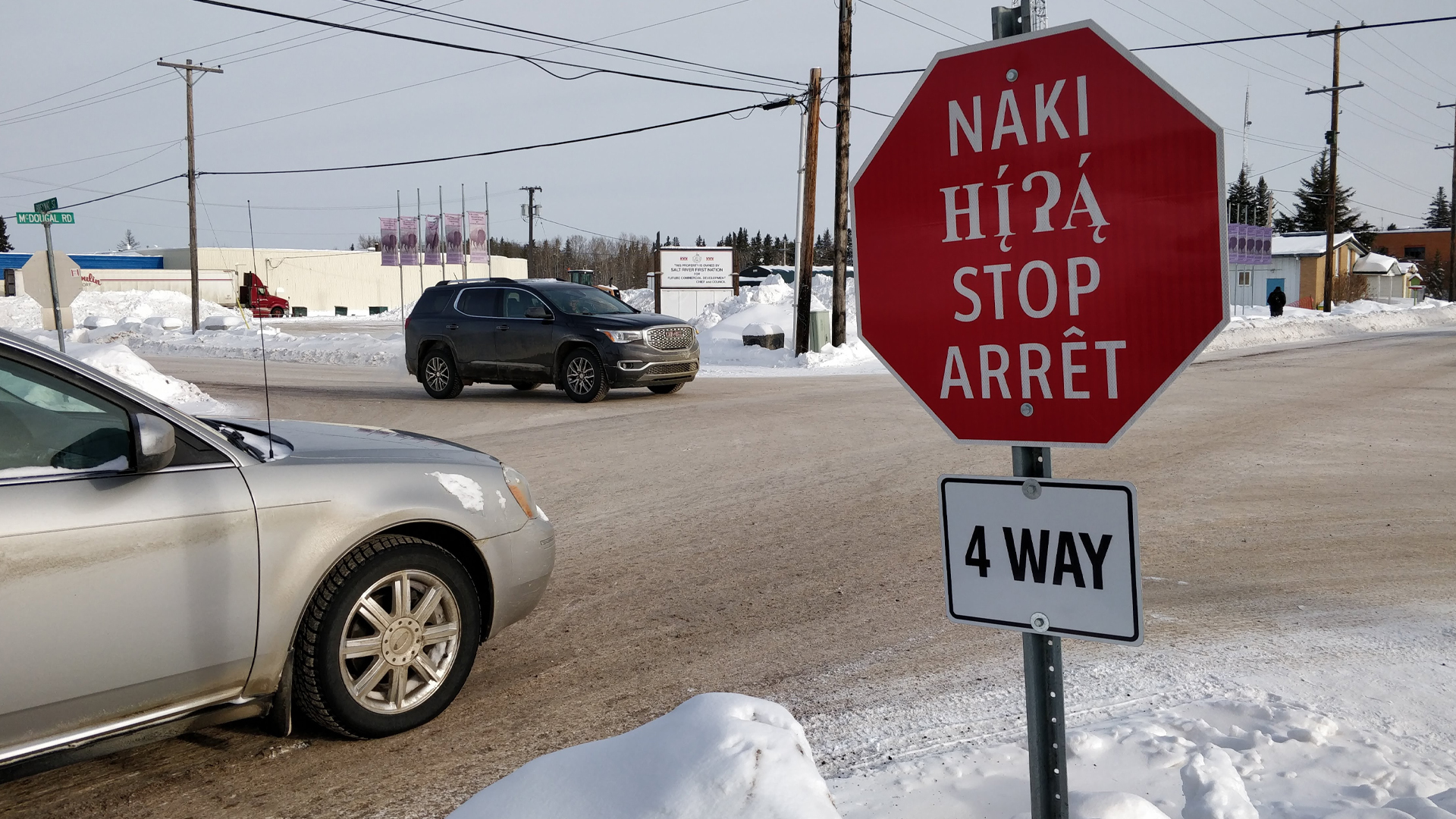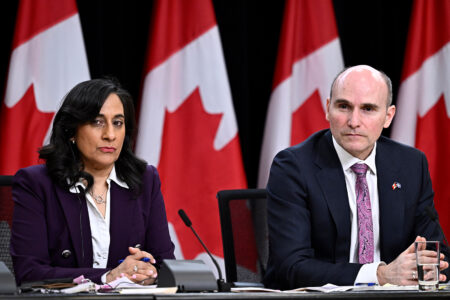
(Version française disponible ici)
Canada’s policy of official bilingualism was designed to ensure equality and inclusion for francophones, and as a recognition of English and French as founding peoples. Of course, this narrative of the founding of Canada ignored the place of Indigenous Peoples, whose languages are under significant threat.
After centuries of forced assimilation and attempted Indigenous erasure, the number of speakers of Indigenous languages continues to decline, and UNESCO says approximately 75 per cent of Indigenous languages in Canada are endangered. To prevent the further degradation of these languages, aggressive action must be taken to protect and revitalize them.
A recent memo from a group of Indigenous public servants called for greater equity for public servants who use an Indigenous language as a second language on the job. Current policies allow public servants who speak both French and English on the job to receive annual bonuses of $800. Additionally, it allows unilingual official language speakers to apply for French-English bilingual positions in the public service, then receive training in English or French as a second language. The allocation of these bonuses has been labelled discriminatory because those who use any two Canadian languages on the job should be compensated equally for their skills, not just those who speak the two official languages.
Indigenous self-government in Yukon holds lessons for all of Canada
The public servants’ memo calls for several changes to these policies to make them more accessible and inclusive to Indigenous employees. It calls for blanket exemptions to French-English bilingual job requirements for employees or applicants who can speak one official language and at least one Indigenous one. Under this type of exemption, the employee/applicant could serve in a bilingual position without necessarily having to speak both French and English, as long as they speak an Indigenous language. The exemption would also provide the opportunity to learn an Indigenous language as a second language to fit the job requirements. However, Treasury Board has firmly rejected this proposal, stating that it “will never change the fundamental principle of bilingualism in the public service.”
Canada has, to some extent, acknowledged the harm done to Indigenous languages and has introduced legislation including the Indigenous Languages Act and the United Nations Declaration on the Rights of Indigenous Peoples Act, which contain protections for Indigenous languages and the promise of stable and predictable funding for revitalization efforts. What this approach fails to realize is that language revitalization is a multidimensional issue that requires much more than just funding. The long list of racist and assimilatory policies against Indigenous Peoples, including the Indian Act and residential schools, have had lasting effects on language and culture. These policies created stigma and shame around speaking Indigenous languages, and created a hierarchy where French and English have taken precedence over Indigenous languages in terms of protection, funding, job opportunities, and more.
This hierarchy does not pertain only to employees in the federal public service. The recent appointment of Mary Simon as Governor General sparked controversy among some francophones. Simon is an Inuk woman who is fluent in both English and Inuktitut but not in French. She has committed to learning French, but some francophones claim that her appointment violates Charter provisions that give English and French equal status in the country, and therefore call into question the validity of the appointment.
To do its part in repairing the damage it caused to Indigenous languages, Canada must make itself a more inclusive space that encourages and entices people to learn an Indigenous language. Offering higher compensation to government employees who use an Indigenous language in the course of their work and offering that training to those who do not is one way to incentivize people to learn an Indigenous language or teach it to others. For this reason, the federal government should re-evaluate its stance on the blanket exemptions and bonuses to public servants who speak an Indigenous language.
However, this remedy is just a drop in the ocean when it comes to making reparations for past and ongoing wrongs against Indigenous Peoples, specifically related to languages.
The federal government’s ability to develop policy that elevates the status of Indigenous languages is limited, as any deviation from official bilingualism would damage the fragile compact between English and French. While the rich diversity of Indigenous languages should absolutely be celebrated and viewed as a strength and asset, the sheer number of Indigenous languages also creates an administrative challenge at the federal level. With an estimated 70 Indigenous languages spoken in Canada, it is difficult to adopt blanket policies that give adequate attention to the individual needs of each language and community to meaningfully help revitalization efforts.
However, unlike the federal government, the provinces and territories have the scope to elevate the status of Indigenous languages within their areas of jurisdiction.
One avenue to explore is the designation of Indigenous languages as their own class of languages within Canada that have elevated status, accessible services, stable funding, and opportunities for personal and professional growth. This designation would ideally reflect the geographic distribution of Indigenous languages for practical reasons.
For example, each province and territory could act to recognize all the Indigenous languages spoken there as regional official languages. These languages could be funded in part by the federal government and administered on the provincial/territorial level so that they could be easily integrated into other provincial/territorial areas of jurisdiction such as education, health care, natural resource management, etc. Not only would this allow people to access services in Indigenous languages, it would also create job opportunities for people who speak them. However, it is essential that Indigenous nations play an active role in the allocation and administration of these funds, and that any related programs or initiatives be developed collaboratively with these nations.
This policy would elevate the status of Indigenous languages and make them more accessible across each province/territory. This type of policy would not require a constitutional amendment and therefore could be implemented relatively quickly, compared with an approach to grant them elevated status at the federal level. Additionally, this alternative would probably be more politically palatable because it would not explicitly change the bilingual status of the country, and would likely not face the type of resistance that the suggestions in the memo faced.
Similar legislation has already been drafted or enacted in some provinces/territories. The Northwest Territories’ Official Languages Act recognizes nine Indigenous languages as official languages in the territory, alongside the federal official languages. Nunavut’s Official Languages Act recognizes the Inuit language (i.e., Inuinnaqtun and Inuktitut) as an official language of Nunavut, alongside the federal official languages. Nova Scotia’s Mi’kmaw Language Act recognizes Mi’kmaw as the original language of the province.
In short, Canada needs to take a more active role in supporting Indigenous communities’ revitalization efforts. Without addressing the systemic discrimination against Indigenous Peoples and their languages, then providing an environment where these languages can grow and thrive, the limited funding that Canada provides to Indigenous nations and communities will not be as effective. Whatever path Canada takes toward addressing Indigenous language revitalization, a successful policy will require extensive consultation and continued partnerships with Indigenous communities; must ensure that these communities are acknowledged as the experts and authorities on their own languages; and the resulting policies must reflect their concerns and ideas.
This article won the op-ed writing prize for graduate students as part of the IRPP’s 2022 Knowledge Mobilizer Awards, established to help mark the institute’s 50th anniversary.












